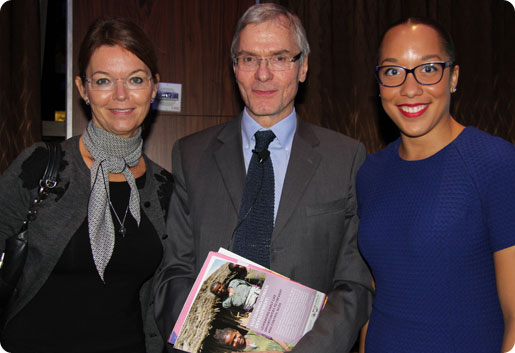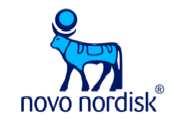Calling for a life-course approach in post-2015 development agenda
Published 09-22-14
Submitted by Novo Nordisk
 Event speakers Professor Mark Hanson, President, International Society for Developmental Origins of Health and Disease; Lise Kingo, Executive Vice President and Chief of Staff, Novo Nordisk; and Krystal Boyea, Vice President, IDF Young Leaders in Diabetes
Event speakers Professor Mark Hanson, President, International Society for Developmental Origins of Health and Disease; Lise Kingo, Executive Vice President and Chief of Staff, Novo Nordisk; and Krystal Boyea, Vice President, IDF Young Leaders in DiabetesNon-communicable diseases (NCDs) are not just a health issue, but a critical and cross cutting development issue that threatens social and economic progress in many parts of the world. The post-2015 development agenda is an opportunity to steer a healthier course for both current and future generations.
We’ve tackled non-communicable disease (NCDs) in completely the wrong way for the past twenty years. We’ve let the world down. This point was made by the President of the Developmental Origins of Health and Disease (DOHaD) Society, Professor Mark Hanson. The risk of NCDs is formed early in life, so we must start early in life to prevent it – even before a child is conceived.
This call to action was made by representatives from civil society, public institutions and the private sector at the September 21st event – Sustaining Human Development: Leveraging Early Life Opportunities to Tackle NCDs – hosted by the NCD Alliance.
The Minister of Health from Rwanda, Dr Agnes Binagwaho, was on the panel and made the case that we need to make healthy living more ‘cool’ and we need to ensure that it is something to aspire to. At present, Dr Binagwaho stated, “unhealthy living in many developing countries is a symbol of development – why walk when you can drive a car?”
Tackling the global epidemic of NCDs requires an entirely new model, panellists agreed. It requires a multi-stakeholder, systemic approach to improve the social, economic and environmental conditions that drive up diabetes and cardiovascular disease. And we need to start early.
Krystal Boyea, a Youth Diabetes Leader of the International Diabetes Federation said that to drive change we need to engage young people. “Educate us, empower us and give us equal access to health,” Ms Boyea stated, highlighting the importance of social media to create networks that empower people.
NCDs make the largest contribution to mortality and disability globally accounting for 63% (36 million) of global deaths with the largest burden - 80% (29 million) – occurring in low- and middle-income countries.[1] Experts speaking at the event presented arguments on how addressing health during pre-conception, pregnancy and in early childhood can prevent NCD risk factors and improve the diagnosis and treatment of diseases such as gestational diabetes. They also stressed the need for more investments into the prevention and control of NCDs and called for donors to make it a priority.
Lise Kingo, executive vice president, Novo Nordisk, agreed that it is important to take a life-course approach to tackling NCDs, but suggested that we must start even before the first 1000 days of life – before pregnancy. “We must help young couples improve their health before they start a family.”
“The time has never been better. We have sufficient evidence and we have the will. If we all come together – the private sector, governments, civil society and academia – we can do it. It has been done before in other disease areas,” Lise Kingo concluded.
Read Novo Nordisk’s position on the post-2015 development agenda
About Novo Nordisk
Headquartered in Denmark, Novo Nordisk is a global healthcare company with more than 90 years of innovation and leadership in diabetes care. The company also has leading positions within haemophilia care, growth hormone therapy and hormone replacement therapy.
Novo Nordisk strives to conduct its activities in a financially, environmentally and socially responsible way. The strategic commitment to corporate sustainability has brought the company onto centre stage as a leading player in today’s business environment, recognised for its integrated reporting, stakeholder engagement and consistently high sustainability performance.
Read more at novonordisk.com/sustainability
[1] Fact sheet about non-communicable diseases, World Health Organisation, www.who.int/mediacentre/factsheets/fs355/en/ (accessed on 10.06.2014)

Novo Nordisk
Novo Nordisk
Novo Nordisk is a global healthcare company with more than 90 years of innovation and leadership in diabetes care. The company also has leading positions within haemophilia care, growth hormone therapy and hormone replacement therapy. We believe that a healthy economy, environment and society are fundamental to long-term value creation. This is why we manage our business in accordance with the Triple Bottom Line business principle and consider the financial, environmental and social impact of our business decisions. The strategic commitment to corporate sustainability has brought the company onto centre stage as a leading player in today's business environment, recognised for its integrated reporting, stakeholder engagement and consistently high sustainability performance.
More from Novo Nordisk

